StarWars.com continues its deep dive interview the supervising director of Star Wars: The Clone Wars!
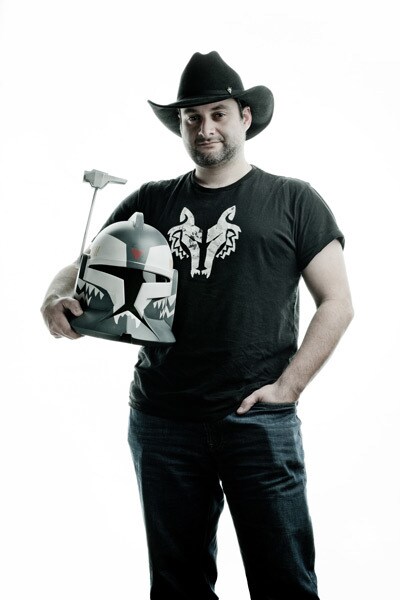
In part two of StarWars.com's three-part interview with Dave Filoni about Star Wars: The Clone Wars Season Five, available now on Blu-ray and DVD, the Pittsburgh native discusses what has to happen when Darth Sidious drops in for a visit, why Darth Maul may not be as bad a guy as we think he is, and how Ahsoka's story ties into the themes of the Star Wars films.
StarWars.com: Can you talk about Maul and Savage versus Sidious? How you depicted it onscreen and the choreography and how it came about?
Dave Filoni: Well, that was definitely one of our biggest challenges, Maul and Savage versus Sidious, because we wanted to have an epic lightsaber fight. We hadn't really had a big one in awhile, and I really thought this is our chance to show everyone why Sidious is the Sith Lord. Why no one can compete with this guy.
What was great was that we had two massive sword fights in a row. We had Vizsla versus Maul, and then we had Maul and Savage versus Sidious. You can do a bit of your own Palpatine-ing there with your artists and get them competing with one another to be the most dynamic, as far as staging goes. And that's totally what I did. I pitted them against each other. [Laughs] I really wanted it to be this exciting, dynamic fight, and we had special meetings devoted just to the style of the fight and the staging of the fight. And with a little bit of research, Kilian Plunkett and I realized that Sidious probably had two lightsabers. Because he fights Mace Windu [in Revenge of the Sith] and then loses his lightsaber, and then he has another one when he fights Yoda. And when we researched it in the archive, fans would be excited to know that we actually found that there were two lightsaber hilts. They're very similar, but there are slight color differences and things between them. So we thought that gave us all the leverage we needed to have him fight with two lightsabers, which I think turned it into a really exciting, phenomenal battle. Like everything we do, it was actually tremendously longer, and we had to cut it much shorter to actually get it onscreen. But the fight inside the palace was probably three or four times as long between Sidious and them, and then when they went outside, I tried to keep as much of that intact as possible, but they fought a longer duel up on the balcony, as well.
The Vizsla fight, if you can believe it, was actually longer, too. And it's hard to believe, because I kept cutting that thing down and cutting it down. At the end of the day, with Sidious, nobody was really going to be able to touch him. He had to be the strongest, most dangerous guy. And you could see at a certain point, he just puts his lightsabers away at the end of the fight and says, "I'm done with this," and goes in and mauls Maul, so to speak. I love the part where Maul begs at the end, because that's the thing about Sith. At the end of the day, if you break them...
StarWars.com: They're very afraid.
Dave Filoni: Yeah, they're very afraid. They're motivated by fear in the beginning. Most people that are terrible and evil, even in our own world, why are they so? Well, they're motivated by fear and then they create terrible things. And Sidious is the devil himself. There is no mercy.
StarWars.com: That whole scene, where Maul is cradling Savage as he dies, and later when he's begging for his life, he reminded me a lot of the Son from the Mortis arc.
Dave Filoni: Oh, sure.
StarWars.com: Was that intentional? Or is it just that the Son represents the dark side and so there is going to be a correlation there?
Dave Filoni: I think it's all of the above. I think part of it is that Sam [Witwer] plays both of them, so there's a natural resonance between the two characters. But part of the reason why, when it came down to it, that I wanted Sam to play Maul was because he had played the Son. And I wanted this concept, which is a very far-out concept, that there were echoes of everything that happened on Mortis happening throughout the show. And that Maul is an echo of the Son and some of the evil the Son was talking about which echoes in our galaxy. There were certain things that Sam and I did vocally that we wanted to be specifically like the Son. When we first find Maul, you can even hear Maul muttering some of the same dialogue that the Son actually says on Mortis. So there's definitely a connection between those two characters, because they're both connected to the dark side of the Force.
StarWars.com: Was there ever any talk of Savage surviving the duel?
Dave Filoni: Yeah, I'll say it first. The writers, we were all very much in the "let's kill Maul" camp, but George [Lucas] didn't want to kill Maul because we'd just gone through such great lengths to get him back. So Savage then became the odd man out.
Sidious can't show up and have people walk out of the room. It's just not gonna happen. As soon as he shows up, people are going to die, bad things are going to happen. Yoda barely escapes [when he fights Sidious in Revenge of the Sith]. So, Savage had to pay the price, and I felt bad for Clancy [Brown] because he did such a great job as Savage. But yeah, he had to go. [Laughs]
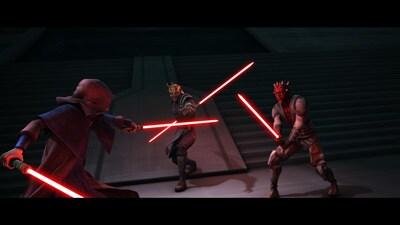
StarWars.com: I found myself feeling a little sympathetic, despite all the things that Maul and Savage did, when Savage was dying. Did Maul really care for him on some level?
Dave Filoni: Well, another thing that we elected to do when we were doing this whole Maul/Savage thing was, we elected to [have Maul] call him "apprentice" and abandon "brother" at the beginning of this four-part season arc. And then at the end he calls him "brother" again. There is a tragic thing to me about Maul, about Savage, because they're apprentices. When you look into those evil characters, you find that, not to say that they're not evil, but how evil are they compared to Sidious? If you listen to Ian McDiarmid [who played Darth Sidious in the films], he'll say that he never had a redeeming quality about him. A lot of other characters, Darth Vader, for example, have redeeming qualities about them, but not Sidious. There's always that separation. And I think, without giving anything away, there's really something to that with Maul. There's an internal struggle that you see with Maul that is trying to tell you there's a lot more to his story than you know, and he's not just an evil force for his whole life, mostly. In the first episode with Savage, I would argue that, well, he doesn't really seem like that bad of a guy. And I think that there's really something to that.
The line that Savage says, "I'm not like you, brother. I never was." That's two things. It's an admission by us as a writing staff that Savage is never going to be Darth Maul. We created another Maul and in doing so, incited the fanbase and made them excited about Zabraks and Maul, and George brought Maul back in the end. So we had to get rid of the Zabrak that we created, who was kind of the puppet Maul. In the end though, he's also saying that he's not, at heart, like Maul. He's not willing go to the depths that Maul obviously was willing to. It's kind of two things happening there for our buddy, Savage.
I think it's a fascinating thing that you are meant to be sympathetic towards these evil characters when they meet their end. I mean, you can be happy about it because they've been overthrown. You don't feel bad for the Emperor when he dies. There's a lot of Gollum and less of that in things with evil characters. They became so because of their pitiful lives and their pitiful existences, and I think that's something that we're saying with this arc and with Maul and Savage. Again, there's more to their character, there's more dimension than you know.
StarWars.com: When Maul came back, I thought, "This is foreshadowing for what's going to happen to Anakin." Right down to his mechanical legs. He keeps himself alive through hate and becomes this twisted thing. And I thought it was successful just on those grounds.
Dave Filoni: Thanks. It's a thing about Sith. They're afraid to die. Fear attracts the fearful. Because for them it's the end; if they die, it's all over. There is nothing for them beyond their existence, because their power is all wrapped up in their life, in their existence. Once that's gone, they believe they lose all their power and everything goes away. They don't live on after death like Jedi learn to, eventually. Jedi believe you become part of the cosmic Force and your existence goes into that, but you don't maintain your consciousness. That's something that Qui-Gon learns, and that idea is developed and Yoda eventually learns it by communing with Qui-Gon, and then he passes it on. But that's the big difference. There's such a big fear of death because they try to hold onto life. And I think that's why they're willing to basically mutilate themselves and live these cybernetic half-human lives. Grievous is an echoing of that. They're taken over by the machine and they're subtracted from nature. And if having midi-chlorians in your blood is part of what makes you [feel] the Force, these are beings that are suddenly subtracted from that.
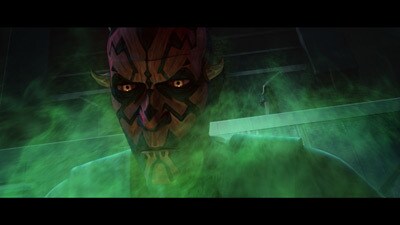
StarWars.com: I wanted to talk about Ahsoka. My feeling is, if it wasn't clear before then it definitely is after the four-part finale, that she's the main character of The Clone Wars. It's really about her journey and her growth, and her leaving the Jedi Order symbolizes a lot about what the war has done to the Jedi. Was where she ends up at the end of Season Five always the intended path for her?
Dave Filoni: For me, yes. [Laughs] I have always been in the "Ahsoka lives" camp, though, if need be Ahsoka would die. I don't have a problem with that if the story demands it. I've always thought Ahsoka's existence is tied to two things: A) if we can come up with a story that's good enough that George said, "Okay, she can keep going," and B) if fans likes the character enough that we can all say, "Okay, she can keep going." Those are two pretty important things.
Her ultimate point is that the Jedi are aware of Anakin's shortcomings. They're not naive to it. Yoda, in particular, talks to Obi-Wan and they give him this Padawan, saying, "Knowing Anakin as we do, he will not want this girl to be around. He'll resist it. But if and when she wins him over, he will bond with her like everything else he does. Like R2-D2, like Obi-Wan, like Padmé. But this girl will be different, because he'll basically raise her. She'll be trained by him, and he will see in the long run that she overcomes her fears and she becomes a Jedi, and she does not need him. But she respects him and they become equals, and Anakin needs to learn this so he can let go." And Yoda knows this is critical for Anakin. If you look at her episodes, as early as when she rescues Plo Koon from the Malevolence, and she's learning from Anakin how to disobey orders but still be creative within following orders. And then she has a big failing when she goes to Ryloth and all these pilots die, in a way, because of her error, and she has to overcome her fear that she's going to let them down again. She's learning. Then we see a big, critical episode arc where Anakin and Luminara kind of compare Padawans, Barriss and Ahsoka. And that arc, I think, really set an interesting tone for ourselves and for the fans. We were trying to illustrate the difference between the way Anakin is raising his Padawan, and how much he cares about her, and the way Luminara raises her Padawan. Not that Luminara is indifferent, but that Luminara is detached. It's not that she doesn't care, but she's not attached to her emotionally.
And at the end of the day, one of the questions that I guess I pose is, is that really a good thing? Is Anakin's way of being so compassionate wrong? Because on a certain level, you have to accept that the Jedi lose the Clone War. So there is something that they're doing that's wrong. There's something they're doing that doesn't work and that the dark side is exploiting. If anything, it's Luke's overwhelming compassion and love for his father that in the end overthrows the Emperor because it's something that he doesn't understand. So as far back as Anakin, there is a seed of an idea of love and compassion, which admittedly in Attack of the Clones, the Jedi say they're lacking because they've become arrogant and very sure of themselves. As Ahsoka gets older, her first big challenge comes when she's abducted by Trandoshans and put an island [to be hunted for sport]. Anakin is put in a position where he can't help her, and he obsesses over trying to find her, and there's nothing he can do. But she survives anyway, and at the end of that she says, "I was only able to do this because of your teachings. Because the other Padawans I was with, boy, they were completely messed up. They were cracking." So again we see this comparison of where Ahsoka is at because of Anakin, and where these other Padawans, which represent the other Jedi, are at. When you get to the finale [of that arc], once you see her pretty much taking on the role of a mentor and teaching these younglings to survive, you see Ahsoka doing more things on her own and you notice Anakin's not around.
Then at the beginning of the last arc [of Season Five], she basically saves Anakin the way Anakin would've always saved her in the past. And Anakin's unconscious, he's like, "What happened?" She says, "I saved your life, don't worry about it." It's fun and he laughs about it then, and he's not embarrassed by it. They're a team. So we get them to that moment and then we put a ton of pressure on it. And through the whole trial, Anakin is the only one that stays 100 percent in her court. I think Plo Koon stays 75-80 percent of the way in her court because he says, "I don't believe she could've fallen so low." In Obi-Wan we really see the Jedi because he is compromised. Obi-Wan doesn't believe Ahsoka is guilty of these crimes, but he has a very hard time arguing politically that the Jedi Council shouldn't do what they do to her. He trusts in the Force, which is what they love to say when they don't know what they're doing, and they expel her. He can't argue the logic. He doesn't like Tarkin's logic [but he can't argue] that they can't try her within the Jedi because the public, which we show in this episode arc, who are losing faith in the Jedi, would cry foul ball. "How can you put her on trial? Of course you'll find her innocent. She's a Jedi and you're a Jedi." So they expose themselves, and we see how they're exposed. All of these things that are wrapped up in Ahsoka's story, which ultimately make her realize what the audience realizes. "I love the Jedi Order. They're very important to me, I've always respected them. But there's something wrong here, and I need to walk away from it to assess it." It all feeds into Revenge of the Sith when the chancellor says, "The Jedi have just made an attempt on my life." When you see these four episodes, I think you have a better understanding of how he gets away with all of that, because you see how compromised the Jedi Council is. And these episodes aren't just meant to get Ahsoka on her way, but they're meant to explain in more detail the scene [in Revenge of the Sith] where Yoda, Mace, and Ki-Adi-Mundi are discussing arresting the chancellor, and what a gamble that's going to be for them. Because you see that to the average Coruscant citizen who's not impressed with this war or the Jedi anymore, they'll see it as treason. It's probably the arc that connects to the movies the most and has the most impact. I think that's why it works on so many levels for me and is one of my favorite arcs, because it's such a companion piece to the films.
StarWars.com: It felt more like Star Wars to me than maybe any other episode arc. There's something about the look of it and Ahsoka on the run from clone/Stormtroopers.
Dave Filoni: I know, right? We definitely fulfill a need, which is to see Stormtroopers chase a Jedi. And I made a very conscious choice [to finally show] the Republic military institution, which we hadn't really seen before. I'd been kind of saving that. But when we got here, I said, "This is the Death Star. I want suspended walkways, I want the walls with the elliptical lights." One of the shots I had in mind when George first started talking about this was I wanted Ahsoka walking out into this massive courtroom. And I knew the shot I was going to do would be her coming and seeing and her expression changing, and the camera swinging around to reveal this massive room, which is like the Death Star and has all the elements from the Death Star in it. You realize that she nor the Jedi might not have realized that while they were fighting the war, how robust this whole military thing had gotten on Coruscant.
StarWars.com: Sprung up all around them.
Dave Filoni: And now they're in the jaws of the machine and they're all in deep trouble. The worst thing of all is, at the end of the day it's still a Jedi who's responsible for the terror. So Tarkin kind of gets his way, whether it's Ahsoka or Barriss. He gets what he wanted. He gets to convict a Jedi of a terrorist act.
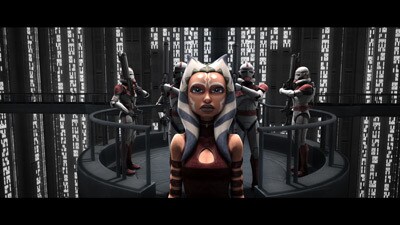
StarWars.com: I was at the Lucasfilm fan screening of the finale, and I was keeping an ear on the crowd's reaction to certain scenes. I was kind of surprised at the reaction when Ahsoka doesn't take her Padawan braid back.
Dave Filoni: Right.
StarWars.com: Because people gasped at first, and then a lot of people started cheering.
Dave Filoni: Yeah! Fantastic, huh?
StarWars.com: What did you make of that?
Dave Filoni: I was really, really surprised by that. Really surprised. I didn't think people would be against it. But I certainly didn't think that people would applaud it, necessarily. I think that there's a certain element there... I mean, we weren't trying to paint the Jedi in a bad light, but certainly you understand her reasons for wanting to leave. We've kind of taken a generation of Star Wars fans and really made them reassess that whole time period to the point where at the end of it, they're on the side of this young girl who's like, "Yeah, this isn't gonna work for me." And I think people feel that right now. They are often in a situation that they'd rather not be in and they wish they could just walk away, and maybe she embodies that. Maybe there's something going on there that we're not aware of. But I don't know, I was pretty fascinated by that. It was a pretty surprising reaction.
George and I went over those final scenes quite a bit. One of the big things was, the whole scene with the Council at the end used to take place outside where Anakin and Ahsoka talk. And it was definitely George, when we watched the first cut of it, who said, "I want to split this so that it's half-inside, half-outside. And the outside is just Anakin and Ahsoka." It was very important to him to separate the two of them out and just have this conversation between them. He wanted kids to know that she didn't blame Anakin for it and that she wasn't upset with Anakin. And I thought it was a great call. When I re-shot the scene it was pretty phenomenal.
There was a debate about Ahsoka at the end, and her just going back to the Jedi at the end of it, and that was the initial impulse. But I kind of argued, "Well, wait. We have an opportunity here with her out to change her story dramatically." And I'm always looking for those opportunities, because you're not sure when they're gonna come, to just grab something and change it dramatically for her. I thought, to do that whole storyline and then have her come back would almost be expected, so why not challenge that.
StarWars.com: I see Ahsoka as an iconic Star Wars character now. At the fan screening you joked that at the beginning of The Clone Wars, you had told Ashley Eckstein, "People are going to hate you at first."
Dave Filoni: Oh, I told her that seriously. It was no surprise to me that that character was going to be met with a lot of skepticism and bile. I told her, "You're entering a situation where people have imagined what Anakin Skywalker was like for 30 years. They saw it in the movies and now we are going to expand that. And never once in my wildest dreams did I imagine he had an apprentice. That just never occurred to me. And George wants this. We have to make it work. But it's going to be met with a lot of resistance." The original version of Ahsoka did not have her calling Anakin "Skyguy," and he did not call her "Snips." It was the story of a young girl that was taken from the Temple and thrust into a war zone. It got changed later; it was decided that was too serious and we had to start from a place of more fun. So she became this snippy, kind of bratty character that talked back to a Star Wars legend, basically. [Laughs] And I was like, "This ain't gonna go over that well." We all knew we were on an edge with it where it's going to go one of two ways: people are going to really like her or people are going to really hate her. But as a fan myself, I understood what people weren't going to like about her. I think part of the brilliant thing about the character that George knew, that at the time in 2005 I was just too inexperienced to know, was that if we start her in this place, we can get her to where she is now. And we were starting her too much like where she ended up now. When you go back and look at her in The Clone Wars movie, she seems like a child. Her attitude, her behavior, and I think it makes it vastly more interesting to go back and watch now. But yeah, I was fully prepared for the bile. I never blame anybody for it. You can't take what fans say personally, you can't get upset about it. They love this stuff. I love this stuff. It's not a matter of right or wrong.
I knew that Ashley herself would be a big part of diffusing the Ahsoka anger. Now I've got 35-year-old guys who are like, "Please don't kill her." So I think in the long run, success. [Laughs]
StarWars.com: What's amazing is, kids who got on board with the show at the beginning have grown up with her and seen her grow up. And now she just means so much to so many people.
Dave Filoni: Yeah. Well, that's a crazy thing. We don't yet really realize the whole depths of it, I think. We don't really get that this generation of kids owns this cartoon as much as we own the original trilogy. And I think people will see that over time.
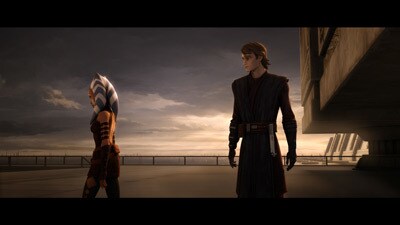
Stay tuned for part three of StarWars.com's interview with Dave Filoni!
Dan Brooks is Lucasfilm's senior content writer, and spends his days writing stuff for and around StarWars.com. He loves Star Wars, ELO, and the New York Rangers, Jets, and Yankees. Follow him on Twitter @dan_brooks where he rants about all these things.

